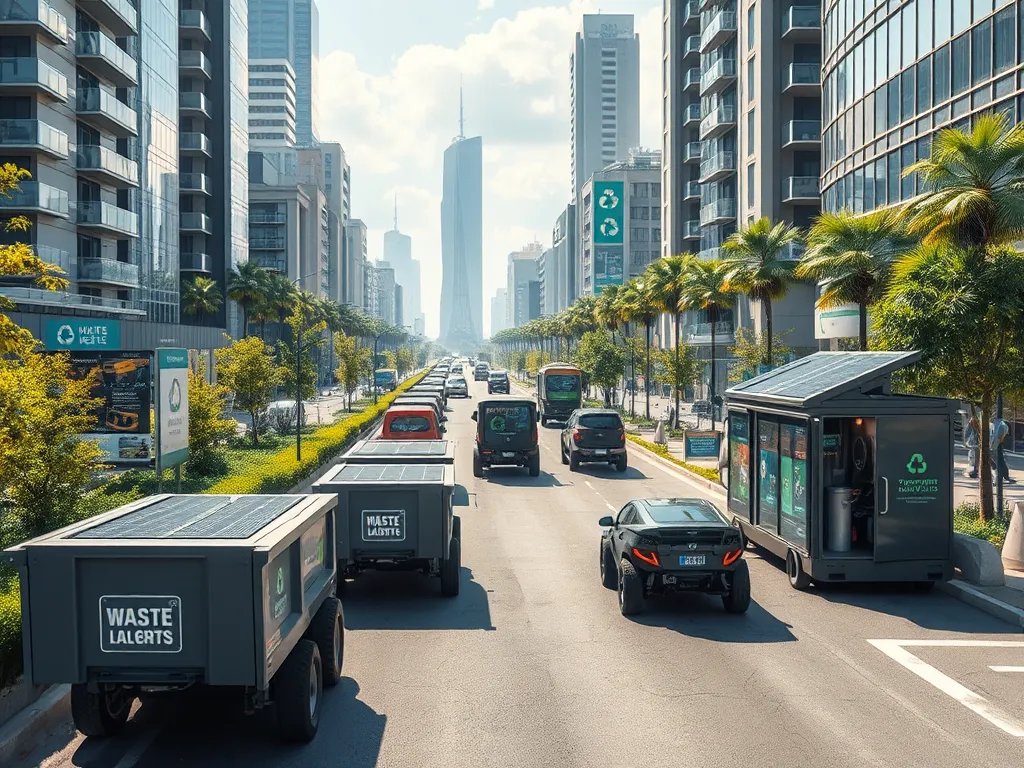Exploring Innovations in Dumpster Rental and Waste Removal Technology

Innovations in Dumpster Rental and Waste Removal Technology
The landscape of waste management is rapidly evolving, driven by the need for more efficient and sustainable solutions. Innovations in dumpster rental and waste removal technology are addressing pressing environmental concerns while improving service delivery. From smart sensors to enhanced recycling methods, these advancements are transforming how waste is managed in urban and rural settings alike.
One of the most significant Innovations in dumpster rental and waste removal technology includes the integration of smart technology. Smart dumpsters equipped with IoT sensors provide real-time data on waste levels, allowing companies to optimize pickup schedules and reduce unnecessary routes. This not only enhances operational efficiency but also diminishes emissions from waste collection vehicles. With an increasing focus on sustainability, these innovations play a crucial role in minimizing the environmental footprint of waste management.
In addition to smart monitoring, the automation of pickup systems represents another breakthrough in the dumpster rental industry. Automated systems enable seamless collection and delivery of dumpsters, catering to various customer needs. This shift not only reduces labor costs but also improves safety for workers, as they are less exposed to traffic and potential hazards during pickups. Innovations in dumpster rental and waste removal technology are crucial to keeping up with ever-increasing waste generation rates across the globe.
Implementing innovative strategies can enhance our approach to recycling, as detailed in the informative guide on https://earth.org/smart-waste-management/.
Mobile applications tailored for dumpster rental management also exemplify the modernization of waste removal services. Users can easily book dumpsters, select sizes, and schedule pickups, all from their smartphones. These mobile platforms also allow for real-time tracking of their orders, giving customers greater transparency and control over the process. By embracing digital solutions, companies are streamlining operations, enhancing customer experience, and driving greater engagement with clients.
Furthermore, the pursuit of sustainable waste management solutions has never been more critical. Innovations in dumpster rental and waste removal technology are prioritizing eco-friendly practices. From the use of recyclable materials in dumpster construction to incorporating cutting-edge waste-to-energy technologies, the focus is shifting towards reducing landfill use and promoting a circular economy. These initiatives help cities and businesses achieve their sustainability goals while fostering a sense of responsibility among consumers.
Smart Dumpster Technology
IoT Sensors for Monitoring Waste Levels: Smart dumpsters featuring IoT sensors are revolutionizing waste management. These sensors track waste levels in real-time, providing critical data that helps waste management companies decide the optimal times for collection. This data-driven approach enables a more efficient routing of collection vehicles, reducing unnecessary trips and associated emissions, thus contributing to a greener environment.
Automated Pickup Systems: The automation of dumpster pickups is a game-changer in waste removal. Using advanced robotics and scheduling technology, automated systems can efficiently handle the collection and drop-off of dumpsters. This not only increases efficiency and safety but also meets the growing demand for services without compromising on quality or increasing operational costs.
Mobile Apps for Dumpster Rental Management: The rise of mobile apps has transformed the dumpster rental process. Customers can easily browse available sizes, check prices, and place orders, all from their mobile devices. These apps can also provide real-time updates about service status, making it easier for customers to manage their waste disposal needs effectively.
Real-time Tracking and Scheduling Features: Innovative tracking and scheduling features in waste management apps offer unparalleled convenience. Customers can monitor their dumpster's location in real-time, ensuring they know when it will arrive. This feature increases reliability and customer satisfaction, while also enabling companies to operate more efficiently.
Sustainable Waste Management Solutions
Eco-friendly Materials for Dumpsters: As awareness around sustainability grows, so does the adoption of eco-friendly materials in dumpster manufacturing. Companies are now investing in durable, recyclable materials that not only perform better but also reduce environmental impact. Such innovations encourage responsible consumption patterns among businesses and individuals.
Recycling Innovations in Waste Removal: Recycling technology has advanced significantly, leading to better separation and processing of recyclable materials. This includes the design of specialized dumpsters that can help separate recyclables at the source, making it easier for consumers to contribute to waste reduction efforts effectively.
Waste-to-Energy Technologies: Innovations in waste-to-energy technologies are becoming more commonplace in waste management practices. By converting waste into energy through various methods, companies can significantly reduce the amount of waste going to landfills while simultaneously providing a renewable energy source. This aligns with global sustainability goals and encourages environmentally responsible waste management practices.
Zero-waste Initiatives in Urban Areas: Many urban areas are now adopting zero-waste initiatives as part of their waste management strategies. These initiatives promote practices that aim to reuse, recycle, and compost waste, ultimately leading to the goal of diverting waste from landfills entirely. Dumpster rental companies play a vital role in facilitating these efforts by providing appropriate systems and resources.
Advanced Waste Sorting Techniques
AI and Machine Learning in Waste Sorting: The application of artificial intelligence (AI) and machine learning in waste sorting is revolutionizing how materials are processed. Leveraging advanced algorithms, machines can accurately identify and sort various types of waste more quickly and efficiently than any manual process, significantly increasing the rate of recycling.
Robotic Systems for Automated Sorting: The introduction of robotic systems in sorting facilities has proven to be an effective solution for enhanced waste management. These robots can handle a high volume of waste, ensuring that recyclable materials are efficiently extracted from mixed waste streams. This automation reduces the margin of error, improves operational efficiency, and increases the overall volume of waste that can be recycled.
Enhanced Manual Sorting Training: While automation plays a significant role, the human element remains critical in waste sorting. Enhanced training programs for manual sorting staff focus on educating workers about proper sorting techniques and the importance of recycling. Well-trained staff can significantly impact the effectiveness of waste management and support the overall recycling ecosystem.
Impact of Sorting on Landfill Reduction: Innovations in sorting technologies have a direct impact on landfill reduction efforts. By improving the accuracy of sorting processes and enhancing recycling capabilities, waste management companies can divert a larger percentage of materials from landfills. This shift not only addresses space concerns but also mitigates environmental damage caused by landfill overflow and pollution.
Regulatory Changes in Waste Removal
Impact of Regulations on Innovations: Regulatory frameworks are evolving to address the urgent need for sustainable waste management practices. These regulations often drive innovations in dumpster rental and waste removal technology, prompting companies to develop cleaner and more efficient technologies that comply with new standards.
Incentives for Cleaner Technologies: Governments and municipalities are increasingly offering incentives for companies that adopt cleaner technologies in waste management. These incentives support research and development efforts, helping to accelerate innovations that minimize environmental impact and contribute to a sustainable future.
Compliance Software for Waste Management: The development of compliance software solutions has made it easier for waste management companies to navigate complex regulations. This software aids companies in tracking their waste handling practices, monitoring compliance, and reporting to relevant authorities, which simplifies the management of waste-related legal obligations and fosters accountability.
Future Regulations on Waste Removal Practices: As the global focus shifts towards sustainability, future regulations are expected to further emphasize waste reduction, recycling, and innovation. Companies will need to stay ahead of these regulatory changes to remain compliant while also investing in new technologies that facilitate better waste management.
Customer-Centric Innovations
User-friendly Rental Platforms: Innovations in dumpster rental technology have led to the emergence of user-friendly platforms that greatly simplify the rental process for consumers. Intuitive interfaces and clear communication help customers easily navigate through their options, making it more accessible for individuals and businesses to rent dumpsters when they need them.
Flexible Payment Options and Subscriptions: Offering flexible payment options and subscription-based models has become a popular trend in the dumpster rental industry. Companies can cater to diverse customer needs while developing long-term relationships with clients, ensuring they have the right solutions for ongoing waste removal requirements.
Customer Feedback Systems for Service Improvement: In an increasingly competitive market, customer feedback systems are crucial for companies to assess the quality of their services. By actively seeking input from customers, waste removal providers can make informed adjustments to improve their offerings, fostering greater customer satisfaction and loyalty.
Integration with Smart Home Systems: The integration of dumpster rental services with smart home systems is a growing trend. Customers can manage their waste disposal needs directly from their smart devices, allowing for greater convenience and control. This innovation reflects a seamless blend of technology and consumer preferences, paving the way for smarter waste management solutions.
